I take a piece of data and put it in a protobuf in both GO and JS and then encode the PB on each platform and the resulting serialized values differ. Since we use the encoded value for signing and hashing, it's critical they match. From what I could gather, I think the difference is the JS is including default values in the encoded output whereas GO is not.
Both platforms start from the same piece of JSON. Here is GO:
listing := new(pb.Listing)
err = jsonpb.UnmarshalString(string(jsonListing), listing)
ser, err := proto.Marshal(listing)
sEnc := b64.StdEncoding.EncodeToString(ser)
the base64 encode value from GO is:
ChR0ZXN0LXRlc3QtdGVzdC1taWxseRLEAQouUW1RMlRoQkw2emNZeEJzQ0gyZlVWM0VVaVBNM3RZbWRuUDNxN2prZTIxdUJNcBpJCiQIARIg1JRiC99XTy49u47TrmPhebH2IoWanvr9rfG2+cj8O4YSIQLJRSKlbpvhAB4nyf2yr0gTbVTXwn8uL41usco/cwtyliJHMEUCIQDqnEyTrFKKNY0FRlbn9wC4+69ozF8C3meKcLQG36nseQIgfJs1dJdFTSM2lGg7hQ68O1PVjAZHWO2XRaogo3OMeUgaKwgEIgYI4LSc/wcqA0xUQyoDQlRDKgNCQ0gqA1pFQzIDVVNEQLgIUIDC1y8ioAIKFFRFU1QgVEVTVCBURVNUIG1pbGx5IGQ6/gEKDG11cmFrYW1pLmpwZxIuUW1WeVZIOFJhbTZNZTNpaHlLZ2p6SnNNMlhaeG5QajZQS1NmbmVSRmY4WmFhRBouUW1laFFoMlNDeVZuWXpZNTduVFAzOWRrbUU3Z0t5ekpHeUhUTko0dXpDM2QyRCIuUW1YcTFSTEt0d2E3VmNSemFhN0dTWEtoVWdIYnBicUhNZWhVS2RDeVVTV1hvNyouUW1VeHlBdHYzdzgxWVFnaEFtckVHTThpbjRYU01QNkROZEVnY1RqNm12UXRjMzIuUW1TODhUcVgySzlwU1VvdnFjczNXbkdhUDFRQjdoTXNSUHdMZFVXNmR5UzRoTFIDTkVXYgAqKQoMVVNBIHNoaXBzdGVyEAEaAuoBKhMKCFN0YW5kYXJkEBkaAzUtNyAK
Here's what JS does:
const ListingPB = getProtoContractsRoot().lookupType('Listing');
const listingPB = ListingPB.fromObject(jsonListing);
const ser = ListingPB
.encode(listingPB)
.finish();
Which results in:
ChR0ZXN0LXRlc3QtdGVzdC1taWxseRLGAQouUW1RMlRoQkw2emNZeEJzQ0gyZlVWM0VVaVBNM3RZbWRuUDNxN2prZTIxdUJNcBIAGkkKJAgBEiDUlGIL31dPLj27jtOuY+F5sfYihZqe+v2t8bb5yPw7hhIhAslFIqVum+EAHifJ/bKvSBNtVNfCfy4vjW6xyj9zC3KWIkcwRQIhAOqcTJOsUoo1jQVGVuf3ALj7r2jMXwLeZ4pwtAbfqex5AiB8mzV0l0VNIzaUaDuFDrw7U9WMBkdY7ZdFqiCjc4x5SBo6CAQQABgAIggI4LSc/wcQACoDTFRDKgNCVEMqA0JDSCoDWkVDMgNVU0Q6AEC4CEoAUIDC1y9dAAAAACKxAgoUVEVTVCBURVNUIFRFU1QgbWlsbHkSABoAIGQoADr+AQoMbXVyYWthbWkuanBnEi5RbVZ5Vkg4UmFtNk1lM2loeUtnanpKc00yWFp4blBqNlBLU2ZuZVJGZjhaYWFEGi5RbWVoUWgyU0N5Vm5Zelk1N25UUDM5ZGttRTdnS3l6Skd5SFROSjR1ekMzZDJEIi5RbVhxMVJMS3R3YTdWY1J6YWE3R1NYS2hVZ0hicGJxSE1laFVLZEN5VVNXWG83Ki5RbVV4eUF0djN3ODFZUWdoQW1yRUdNOGluNFhTTVA2RE5kRWdjVGo2bXZRdGMzMi5RbVM4OFRxWDJLOXBTVW92cWNzM1duR2FQMVFCN2hNc1JQd0xkVVc2ZHlTNGhMTQAAAABSA05FV2IGEgAYACAAKikKDFVTQSBzaGlwc3RlchABGgLqASoTCghTdGFuZGFyZBAZGgM1LTcgCkoAUgA=
...which is different than what GO is coming up with.
If I bring both those base64 strings into JS, decode them into a PB and then toJSON() that PB and look at the diff of the two objects, it looks like the difference is that JS is serializing the default values and GO is not (JS is on the right).
I have tried serializing JS as so, but the result is the same:
const ser =
ListingPB
.encode(ListingPB.toObject(listingPB, { defaults: false }))
.finish();
So, is there any way I could make the output consistent between the two platforms? The raw JSON input is the same going in, but the results on the way out differ.
